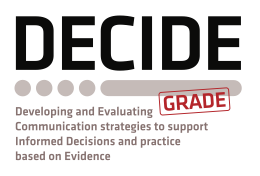
All of us - health professionals, patients, policymakers and the public - want to make healthcare decisions based on the best available research evidence. Guidelines aim to support these decisions but are generally developed as a one-size-fits-all package, with no attempt to tailor content to the needs of different types of user. This means that the substantial work that guideline producers put into guideline production may not translate into the hoped-for health care benefits.
The EU-funded project DECIDE is working on innovative ways to present research evidence in guidelines that is specifically tailored to meet the needs of different types of user.
We have divided the work into five parts, each focused on a different type of guideline user: health professionals; policymakers and manager; patients and public, people making diagnostic decisions and people making decisions about health system interventions. While the evidence underpinning a guideline may remain constant, how that same information is presented to a health professional will be different to how it is presented to a policymaker.
Developing presentations is an iterative process involving all or some of brainstorming with users, formal user-testing of prototypes and trials. User-testing in particular is central; people from a user group were asked to look at a prototype and then gave their comments and opinions on it. This process provides rich feedback with relatively few tests and is especially valuable in picking up ‘showstoppers’: characteristics that are so off-target that users cannot use the prototype at all. Prototypes were modified in light of what was learnt from testing and then re-evaluated.
DECIDE has other outputs too. Literature reviews of grading systems for diagnostic tests and the public’s attitudes to, and awareness of, guidelines have been published. Frameworks to support guideline panels to explicitly consider research evidence in their judgements when making recommendations have been developed and tested with World Health Organisation (WHO) guideline panels and others. A tool to present interactive versions of evidence summaries allows user to tailor a presentation to their own needs. The GRADEPro Guideline Development Toolkit (GRADEProGDT: http://www.guidelinedevelopment.org), which packages much of DECIDE’s work, was launched in 2013.
Dissemination has been key throughout the project and has been helped through the substantial collaboration with the GRADE Working Group (http://www.gradeworkinggroup.org), the work of which underpins many guidelines and much of DECIDE. DECIDE partners have presented work to the European Commission's European Monitoring Centre for Drugs and Drug Addiction (EMCDDA), WHO and had a major presence at the annual Guidelines International Conferences. A DECIDE international conference was held in Edinburgh in 2014 to further disseminate results to over 250 international participants.
DECIDE is providing new information for guideline producers about they can best meet the needs of the different user of their guidelines as well as how they can be more systematic about using research evidence when making their recommendations. GRADEProGDT, and the link to the GRADE Working Group, means that guideline producers and other will benefit from DECIDE’s results well beyond the end of the project. DECIDE is led by Shaun Treweek at the University of Aberdeen and Andy Oxman at the Norwegian Knowledge Centre for the Health Services, Norway. The protocol for the DECIDE study is available at http://www.implementationscience.com/content/8/1/6. Further details are available at http://www.decide-collaboration.eu.
Contacts
- Shaun Treweek; streweek@mac.com
